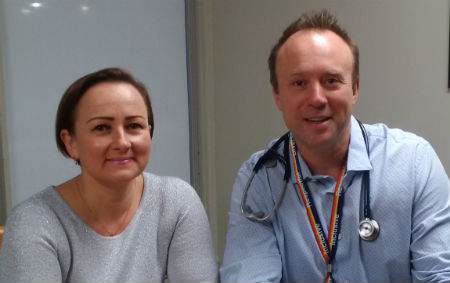|
|
|
|

|
Medicinal cannabis may hold key to treating chronic conditions in seniors without affecting quality of life, says doctor
‘If we can use something that is natural like this …, I think this can only be a positive’
2/12/2018
-
Deron Hamel
|
|
Trillium Villa attending physician Dr. John O’Mahony and nurse practitioner Oksana Konko.
|
|
Trillium Villa’s attending physician Dr. John O’Mahony says the medical community is often looking for novel and viable treatments for common conditions affecting the senior population, and medicinal cannabis holds promise.
Historically, the challenge has been to find effective treatments that do not impede on quality of life or interfere with kidney function for the senior population, Dr. O’Mahony says.
For instance, chronic pain is a common issue among long-term-care home residents as are responsive behaviours caused by dementia. But, he notes, options to treat such conditions are sometimes limited because many residents also live with poor kidney function – and often the medications used to treat conditions get metabolized by the kidneys.
But a new partnership Trillium Villa has formed with a local physician in Sarnia, Dr. Blake Pearson, to trial medicinal cannabis with residents could address some of the common conditions residents cope with – without encroaching on their quality of life.
“What we are excited about is that with the cannabinoid medicine we can treat chronic pain without worrying about the kidney function,” Dr. O’Mahony says.
“For people with the resistive behaviours, we end up using antipsychotics, but there are a lot of side effects to antipsychotics. … So we are excited to see how (cannabinoid medicine) can lower the amount of narcotics (and) lower the amount of antipsychotics that we have to use.”
Through the partnership, Dr. O’Mahony is identifying residents who may benefit from this therapy. Once selected to try the therapy, and after residents and their family members have given consent, nurse practitioner Oksana Konko will write referrals and Dr. Pearson will then write prescriptions.
The oil residents will receive will have a higher ratio of cannabidiol (CBD) content to tetrahydrocannabinol (THC) content. CBD is the most abundant, non-psychoactive chemical compound in cannabis. Unlike THC, the most abundant chemical compound in cannabis, CBD will not get people “high.”
“It’s all about de-prescribing in the elderly,” Dr. O’Mahony says of the partnership. “If we can use something that is natural like this and we go very slowly and titrate upwards, I think this can only be a positive.”
- This is Part 4 of a four-part story series.
Do you have a story you would like to share with S&R Today? If so, please contact the newsroom at deron(at)axiomnews.com.
If you have feedback on this story, please e-mail deron(at)axiomnews.com.
|
|
|